Deck 16: The Nature of Mathematical Systems
Question
Question
Question
Question
Question
Question
Question
Question
Question
Question
Question
Question
Question
Question
Question
Question
Question
Question
Question
Question
Question
Question
Question
Question
Question
Question
Question
Question
Question
Question
Question
Question
Question
Question
Question
Question
Question
Question
Question
Question
Question
Question
Question
Question
Question
Question
Question
Question
Question
Question
Question
Question
Question
Question
Question
Question
Question
Question
Question
Question
Question
Question
Question
Question
Question
Question
Question
Question
Question
Question
Question
Question
Question
Question
Question
Question
Question
Question
Question
Question

Unlock Deck
Sign up to unlock the cards in this deck!
Unlock Deck
Unlock Deck
1/97
Play
Full screen (f)
Deck 16: The Nature of Mathematical Systems
1
Find the corner points for the set of feasible solutions for the constraints given in problem.
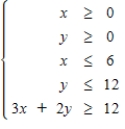
A) ( 0, 0 ), ( 6, 12 ), ( 6, 0 )
B) ( 0, 6 ), ( 0, 12 ), ( 6, 12 ), ( 6, 0 ), ( 4, 0 )
C) ( 0, 0 ), ( 0, 12 ), ( 6, 12 ), ( 6, 0 )
D) ( 0, 0 ), ( 4, 0 ), ( 0, 6 )
E) (0, 0), ( 0, 6 ), ( 0, 12 ), ( 6, 0 ), ( 4, 0 )

A) ( 0, 0 ), ( 6, 12 ), ( 6, 0 )
B) ( 0, 6 ), ( 0, 12 ), ( 6, 12 ), ( 6, 0 ), ( 4, 0 )
C) ( 0, 0 ), ( 0, 12 ), ( 6, 12 ), ( 6, 0 )
D) ( 0, 0 ), ( 4, 0 ), ( 0, 6 )
E) (0, 0), ( 0, 6 ), ( 0, 12 ), ( 6, 0 ), ( 4, 0 )
( 0, 6 ), ( 0, 12 ), ( 6, 12 ), ( 6, 0 ), ( 4, 0 )
2
Find the corner points for the set of feasible solutions for the constraints given in problem. 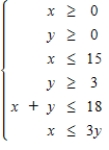
A) 
B) 
C) 
D) 
E) 

A)

B)

C)

D)

E)



3
Decide which of the points below is a feasible solution for the given constraints. 
A) ( -1, 3 )
B) ( -3, 3 )
C) ( 2, 1 )
D) ( 3, 3 )
E) none of these choices

A) ( -1, 3 )
B) ( -3, 3 )
C) ( 2, 1 )
D) ( 3, 3 )
E) none of these choices
( 2, 1 )
4
Find the corner points for the set of feasible solutions for the constraints.
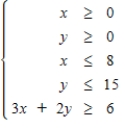


Unlock Deck
Unlock for access to all 97 flashcards in this deck.
Unlock Deck
k this deck
5
Find the matrix [ A ] ( [ B ] + [ C ] ), if ![<strong>Find the matrix [ A ] ( [ B ] + [ C ] ), if , , </strong> A) B) C) D) E) ](https://d2lvgg3v3hfg70.cloudfront.net/TB7816/11eac9cf_f872_fd3c_a07b_ff18080d92de_TB7816_00.jpg) ,
, ![<strong>Find the matrix [ A ] ( [ B ] + [ C ] ), if , , </strong> A) B) C) D) E) ](https://d2lvgg3v3hfg70.cloudfront.net/TB7816/11eac9cf_f873_244d_a07b_abafbdee2d05_TB7816_00.jpg) ,
, ![<strong>Find the matrix [ A ] ( [ B ] + [ C ] ), if , , </strong> A) B) C) D) E) ](https://d2lvgg3v3hfg70.cloudfront.net/TB7816/11eac9cf_f873_244e_a07b_056b10423f03_TB7816_00.jpg)
A)![<strong>Find the matrix [ A ] ( [ B ] + [ C ] ), if , , </strong> A) B) C) D) E) ](https://d2lvgg3v3hfg70.cloudfront.net/TB7816/11eac9cf_f873_4b5f_a07b_9778f7879c05_TB7816_00.jpg)
B) ![<strong>Find the matrix [ A ] ( [ B ] + [ C ] ), if , , </strong> A) B) C) D) E) ](https://d2lvgg3v3hfg70.cloudfront.net/TB7816/11eac9cf_f873_7270_a07b_f3b745d27e26_TB7816_00.jpg)
C) ![<strong>Find the matrix [ A ] ( [ B ] + [ C ] ), if , , </strong> A) B) C) D) E) ](https://d2lvgg3v3hfg70.cloudfront.net/TB7816/11eac9cf_f873_7271_a07b_bbb0897dab06_TB7816_00.jpg)
D) ![<strong>Find the matrix [ A ] ( [ B ] + [ C ] ), if , , </strong> A) B) C) D) E) ](https://d2lvgg3v3hfg70.cloudfront.net/TB7816/11eac9cf_f873_9982_a07b_9ddcdf1e4655_TB7816_00.jpg)
E) ![<strong>Find the matrix [ A ] ( [ B ] + [ C ] ), if , , </strong> A) B) C) D) E) ](https://d2lvgg3v3hfg70.cloudfront.net/TB7816/11eac9cf_f873_c093_a07b_9b417e34704d_TB7816_00.jpg)
![<strong>Find the matrix [ A ] ( [ B ] + [ C ] ), if , , </strong> A) B) C) D) E) ](https://d2lvgg3v3hfg70.cloudfront.net/TB7816/11eac9cf_f872_fd3c_a07b_ff18080d92de_TB7816_00.jpg) ,
, ![<strong>Find the matrix [ A ] ( [ B ] + [ C ] ), if , , </strong> A) B) C) D) E) ](https://d2lvgg3v3hfg70.cloudfront.net/TB7816/11eac9cf_f873_244d_a07b_abafbdee2d05_TB7816_00.jpg) ,
, ![<strong>Find the matrix [ A ] ( [ B ] + [ C ] ), if , , </strong> A) B) C) D) E) ](https://d2lvgg3v3hfg70.cloudfront.net/TB7816/11eac9cf_f873_244e_a07b_056b10423f03_TB7816_00.jpg)
A)
![<strong>Find the matrix [ A ] ( [ B ] + [ C ] ), if , , </strong> A) B) C) D) E) ](https://d2lvgg3v3hfg70.cloudfront.net/TB7816/11eac9cf_f873_4b5f_a07b_9778f7879c05_TB7816_00.jpg)
B)
![<strong>Find the matrix [ A ] ( [ B ] + [ C ] ), if , , </strong> A) B) C) D) E) ](https://d2lvgg3v3hfg70.cloudfront.net/TB7816/11eac9cf_f873_7270_a07b_f3b745d27e26_TB7816_00.jpg)
C)
![<strong>Find the matrix [ A ] ( [ B ] + [ C ] ), if , , </strong> A) B) C) D) E) ](https://d2lvgg3v3hfg70.cloudfront.net/TB7816/11eac9cf_f873_7271_a07b_bbb0897dab06_TB7816_00.jpg)
D)
![<strong>Find the matrix [ A ] ( [ B ] + [ C ] ), if , , </strong> A) B) C) D) E) ](https://d2lvgg3v3hfg70.cloudfront.net/TB7816/11eac9cf_f873_9982_a07b_9ddcdf1e4655_TB7816_00.jpg)
E)
![<strong>Find the matrix [ A ] ( [ B ] + [ C ] ), if , , </strong> A) B) C) D) E) ](https://d2lvgg3v3hfg70.cloudfront.net/TB7816/11eac9cf_f873_c093_a07b_9b417e34704d_TB7816_00.jpg)

Unlock Deck
Unlock for access to all 97 flashcards in this deck.
Unlock Deck
k this deck
6
Find the sum [ A ] + [ B ], if ![<strong>Find the sum [ A ] + [ B ], if </strong> A) B) C) D) E) ](https://d2lvgg3v3hfg70.cloudfront.net/TB7816/11eac9cf_f871_ebc0_a07b_abdce20cba13_TB7816_00.jpg)
A)![<strong>Find the sum [ A ] + [ B ], if </strong> A) B) C) D) E) ](https://d2lvgg3v3hfg70.cloudfront.net/TB7816/11eac9cf_f871_ebc1_a07b_55d93c858f12_TB7816_00.jpg)
B) ![<strong>Find the sum [ A ] + [ B ], if </strong> A) B) C) D) E) ](https://d2lvgg3v3hfg70.cloudfront.net/TB7816/11eac9cf_f872_12d2_a07b_e335f7cf8d98_TB7816_00.jpg)
C) ![<strong>Find the sum [ A ] + [ B ], if </strong> A) B) C) D) E) ](https://d2lvgg3v3hfg70.cloudfront.net/TB7816/11eac9cf_f872_12d3_a07b_7d79fd8ce92d_TB7816_00.jpg)
D) ![<strong>Find the sum [ A ] + [ B ], if </strong> A) B) C) D) E) ](https://d2lvgg3v3hfg70.cloudfront.net/TB7816/11eac9cf_f872_39e4_a07b_99e3c6a3f2fa_TB7816_00.jpg)
E) ![<strong>Find the sum [ A ] + [ B ], if </strong> A) B) C) D) E) ](https://d2lvgg3v3hfg70.cloudfront.net/TB7816/11eac9cf_f872_39e5_a07b_731e1bad88f8_TB7816_00.jpg)
![<strong>Find the sum [ A ] + [ B ], if </strong> A) B) C) D) E) ](https://d2lvgg3v3hfg70.cloudfront.net/TB7816/11eac9cf_f871_ebc0_a07b_abdce20cba13_TB7816_00.jpg)
A)
![<strong>Find the sum [ A ] + [ B ], if </strong> A) B) C) D) E) ](https://d2lvgg3v3hfg70.cloudfront.net/TB7816/11eac9cf_f871_ebc1_a07b_55d93c858f12_TB7816_00.jpg)
B)
![<strong>Find the sum [ A ] + [ B ], if </strong> A) B) C) D) E) ](https://d2lvgg3v3hfg70.cloudfront.net/TB7816/11eac9cf_f872_12d2_a07b_e335f7cf8d98_TB7816_00.jpg)
C)
![<strong>Find the sum [ A ] + [ B ], if </strong> A) B) C) D) E) ](https://d2lvgg3v3hfg70.cloudfront.net/TB7816/11eac9cf_f872_12d3_a07b_7d79fd8ce92d_TB7816_00.jpg)
D)
![<strong>Find the sum [ A ] + [ B ], if </strong> A) B) C) D) E) ](https://d2lvgg3v3hfg70.cloudfront.net/TB7816/11eac9cf_f872_39e4_a07b_99e3c6a3f2fa_TB7816_00.jpg)
E)
![<strong>Find the sum [ A ] + [ B ], if </strong> A) B) C) D) E) ](https://d2lvgg3v3hfg70.cloudfront.net/TB7816/11eac9cf_f872_39e5_a07b_731e1bad88f8_TB7816_00.jpg)

Unlock Deck
Unlock for access to all 97 flashcards in this deck.
Unlock Deck
k this deck
7
Maximize  subject to the constraints.
subject to the constraints.

T = ____ at ( ____, ____ )
 subject to the constraints.
subject to the constraints.

T = ____ at ( ____, ____ )

Unlock Deck
Unlock for access to all 97 flashcards in this deck.
Unlock Deck
k this deck
8
Find the corner points for the set of feasible solutions for the constraints given in problem. 
A) ( 0, 0 ), ( 7, 0 ), ( 0, 6 ), ( 4, 3 ), ( 13, 1 )
B) ( 7, 0 ), ( 0, 6 ), ( 4, 3 )
C) ( 13, 1 ), ( 7, 0 ), ( 0, 6 ), ( 4, 3 )
D) ( 0, 0 ), ( 8, 0 ), ( 0, 7 ), ( 4, 3 )
E) ( 0, 0 ), ( 7, 0 ), ( 0, 6 ), ( 4, 3 )

A) ( 0, 0 ), ( 7, 0 ), ( 0, 6 ), ( 4, 3 ), ( 13, 1 )
B) ( 7, 0 ), ( 0, 6 ), ( 4, 3 )
C) ( 13, 1 ), ( 7, 0 ), ( 0, 6 ), ( 4, 3 )
D) ( 0, 0 ), ( 8, 0 ), ( 0, 7 ), ( 4, 3 )
E) ( 0, 0 ), ( 7, 0 ), ( 0, 6 ), ( 4, 3 )

Unlock Deck
Unlock for access to all 97 flashcards in this deck.
Unlock Deck
k this deck
9
The Thompson Company manufactures two industrial products, standard ($45 profit per item) and economy ($30 profit per item). These items are built using machine time and manual labor. The standard product requires 2 hr of machine time and 1 hr of manual labor. The economy model requires 2 hr of machine time and no manual labor. If the week's supply of manual labor is limited to 900 hr and machine time to 9,000 hr, how much of each type of product should be produced each week to maximize the profit?
A) no standard models and 4,500 economy models
B) 900 standard models and 3,600 economy models
C) 900 standard models and 2,250 economy models
D) 4,500 standard models and no economy models
E) 2,250 standard models and 2,250 economy models
A) no standard models and 4,500 economy models
B) 900 standard models and 3,600 economy models
C) 900 standard models and 2,250 economy models
D) 4,500 standard models and no economy models
E) 2,250 standard models and 2,250 economy models

Unlock Deck
Unlock for access to all 97 flashcards in this deck.
Unlock Deck
k this deck
10
Minimize  subject to the constraints.
subject to the constraints. 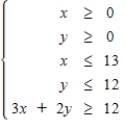
A)
B) 
C) 
D) 
E) 
 subject to the constraints.
subject to the constraints. 
A)

B)

C)

D)

E)


Unlock Deck
Unlock for access to all 97 flashcards in this deck.
Unlock Deck
k this deck
11
Graph the solution of the system. 
A) 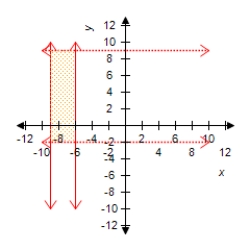
B)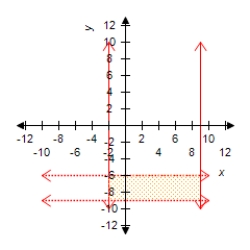
C)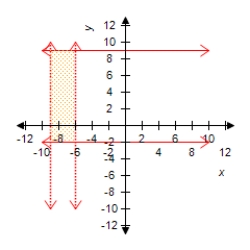
D)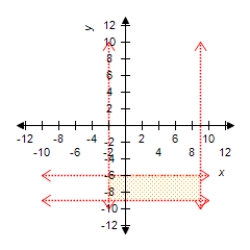
E)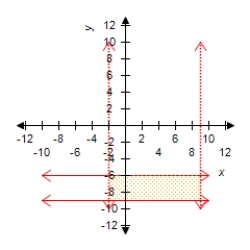

A)

B)

C)

D)

E)


Unlock Deck
Unlock for access to all 97 flashcards in this deck.
Unlock Deck
k this deck
12
Decide whether the point  is a feasible solution for the constraints.
is a feasible solution for the constraints.

Answer yes or no.
 is a feasible solution for the constraints.
is a feasible solution for the constraints.

Answer yes or no.

Unlock Deck
Unlock for access to all 97 flashcards in this deck.
Unlock Deck
k this deck
13
Minimize  subject to the constraints.
subject to the constraints.
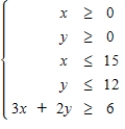
K = ____ at ( ____, ____)
 subject to the constraints.
subject to the constraints.

K = ____ at ( ____, ____)

Unlock Deck
Unlock for access to all 97 flashcards in this deck.
Unlock Deck
k this deck
14
Find the product [ A ][ B ], if ![<strong>Find the product [ A ][ B ], if </strong> A) B) C) D) E)](https://d2lvgg3v3hfg70.cloudfront.net/TB7816/11eac9cf_f872_60f6_a07b_db57b3f22441_TB7816_00.jpg)
A)![<strong>Find the product [ A ][ B ], if </strong> A) B) C) D) E)](https://d2lvgg3v3hfg70.cloudfront.net/TB7816/11eac9cf_f872_60f7_a07b_55fdcfb65159_TB7816_00.jpg)
B)![<strong>Find the product [ A ][ B ], if </strong> A) B) C) D) E)](https://d2lvgg3v3hfg70.cloudfront.net/TB7816/11eac9cf_f872_8808_a07b_7d0780e01267_TB7816_00.jpg)
C)![<strong>Find the product [ A ][ B ], if </strong> A) B) C) D) E)](https://d2lvgg3v3hfg70.cloudfront.net/TB7816/11eac9cf_f872_8809_a07b_9dbf28e4cdfd_TB7816_00.jpg)
D)![<strong>Find the product [ A ][ B ], if </strong> A) B) C) D) E)](https://d2lvgg3v3hfg70.cloudfront.net/TB7816/11eac9cf_f872_af1a_a07b_6b29334636ff_TB7816_00.jpg)
E)![<strong>Find the product [ A ][ B ], if </strong> A) B) C) D) E)](https://d2lvgg3v3hfg70.cloudfront.net/TB7816/11eac9cf_f872_d62b_a07b_e3ec38cce583_TB7816_00.jpg)
![<strong>Find the product [ A ][ B ], if </strong> A) B) C) D) E)](https://d2lvgg3v3hfg70.cloudfront.net/TB7816/11eac9cf_f872_60f6_a07b_db57b3f22441_TB7816_00.jpg)
A)
![<strong>Find the product [ A ][ B ], if </strong> A) B) C) D) E)](https://d2lvgg3v3hfg70.cloudfront.net/TB7816/11eac9cf_f872_60f7_a07b_55fdcfb65159_TB7816_00.jpg)
B)
![<strong>Find the product [ A ][ B ], if </strong> A) B) C) D) E)](https://d2lvgg3v3hfg70.cloudfront.net/TB7816/11eac9cf_f872_8808_a07b_7d0780e01267_TB7816_00.jpg)
C)
![<strong>Find the product [ A ][ B ], if </strong> A) B) C) D) E)](https://d2lvgg3v3hfg70.cloudfront.net/TB7816/11eac9cf_f872_8809_a07b_9dbf28e4cdfd_TB7816_00.jpg)
D)
![<strong>Find the product [ A ][ B ], if </strong> A) B) C) D) E)](https://d2lvgg3v3hfg70.cloudfront.net/TB7816/11eac9cf_f872_af1a_a07b_6b29334636ff_TB7816_00.jpg)
E)
![<strong>Find the product [ A ][ B ], if </strong> A) B) C) D) E)](https://d2lvgg3v3hfg70.cloudfront.net/TB7816/11eac9cf_f872_d62b_a07b_e3ec38cce583_TB7816_00.jpg)

Unlock Deck
Unlock for access to all 97 flashcards in this deck.
Unlock Deck
k this deck
15
Maximize  subject to the given constraints.
subject to the given constraints.

A) 
B) 
C) 
D) 
E) 
 subject to the given constraints.
subject to the given constraints.

A)

B)

C)

D)

E)


Unlock Deck
Unlock for access to all 97 flashcards in this deck.
Unlock Deck
k this deck
16
The Thompson Company manufactures two industrial products, standard ($55 profit per item) and economy ($25 profit per item). These items are built using machine time and manual labor. The standard product requires 4 hr of machine time and 3 hr of manual labor. The economy model requires 4 hr of machine time and no manual labor. If the week's supply of manual labor is limited to 600 hr and machine time to 12,000 hr, how much of each type of product should be produced each week to maximize the profit?
__________ standard models and __________ economy models.
__________ standard models and __________ economy models.

Unlock Deck
Unlock for access to all 97 flashcards in this deck.
Unlock Deck
k this deck
17
Write  for the matrices
for the matrices 
A)
B)
C)
D)
E)
 for the matrices
for the matrices 
A)

B)

C)

D)

E)


Unlock Deck
Unlock for access to all 97 flashcards in this deck.
Unlock Deck
k this deck
18
Find the corner points for the set of feasible solutions for the constraints.



Unlock Deck
Unlock for access to all 97 flashcards in this deck.
Unlock Deck
k this deck
19
Write a linear programming model, including the objective function and the set of constraints for the following problem. DO NOT SOLVE, but be sure to define all your variables.
Brown Bros., Inc., is an investment company doing an analysis of the pension fund for a certain company. The fund has a maximum of $10 million to invest in two places: no more than $8 million in stocks yielding 12%, and at least $2 million in long-term bonds yielding 9%. The stock-to-bond investment ratio cannot be more than 2 to 1. How should Brown Bros. advise its client so that the investments yield the maximum yearly return?
DENOTE:
X = amount invested in stock (in millions of dollars)
Y = amount invested in bonds (in millions of dollars)
A)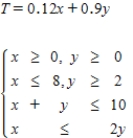
B)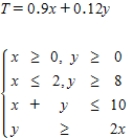
C)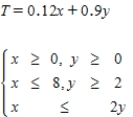
D)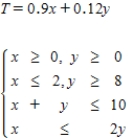
E)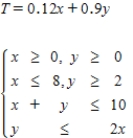
Brown Bros., Inc., is an investment company doing an analysis of the pension fund for a certain company. The fund has a maximum of $10 million to invest in two places: no more than $8 million in stocks yielding 12%, and at least $2 million in long-term bonds yielding 9%. The stock-to-bond investment ratio cannot be more than 2 to 1. How should Brown Bros. advise its client so that the investments yield the maximum yearly return?
DENOTE:
X = amount invested in stock (in millions of dollars)
Y = amount invested in bonds (in millions of dollars)
A)

B)

C)

D)

E)


Unlock Deck
Unlock for access to all 97 flashcards in this deck.
Unlock Deck
k this deck
20
Find the corner points for the set of feasible solutions for the constraints.
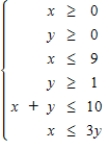


Unlock Deck
Unlock for access to all 97 flashcards in this deck.
Unlock Deck
k this deck
21
Given the matrix, perform elementary row operation to obtain zeros under the 1 in the first column. 
A) 

B)


C)


D) 

E)



A)


B)


C)


D)


E)



Unlock Deck
Unlock for access to all 97 flashcards in this deck.
Unlock Deck
k this deck
22
Solve the system by solving the corresponding matrix equation with an inverse, if possible.

Enter the answer in the form (x, y).

Enter the answer in the form (x, y).

Unlock Deck
Unlock for access to all 97 flashcards in this deck.
Unlock Deck
k this deck
23
Solve the system by solving the corresponding matrix equation with an inverse, if possible.

Enter the answer in the form ,
,  ,
,  .
.

Enter the answer in the form
 ,
,  ,
,  .
.
Unlock Deck
Unlock for access to all 97 flashcards in this deck.
Unlock Deck
k this deck
24
Solve the system by solving the corresponding matrix equation with an inverse, if possible.

A) (4, 3)
B) (5, 4)
C) (3, 3)
D) (4, 4)
E) (5, 5)

A) (4, 3)
B) (5, 4)
C) (3, 3)
D) (4, 4)
E) (5, 5)

Unlock Deck
Unlock for access to all 97 flashcards in this deck.
Unlock Deck
k this deck
25
Solve the system by solving the corresponding matrix equation with an inverse, if possible.

Enter the answer in the form ,
,  ,
,  .
.

Enter the answer in the form
 ,
,  ,
,  .
.
Unlock Deck
Unlock for access to all 97 flashcards in this deck.
Unlock Deck
k this deck
26
Write the system in augmented matrix form. 
A)
B) 
C) 
D) 
E) 

A)

B)

C)

D)

E)


Unlock Deck
Unlock for access to all 97 flashcards in this deck.
Unlock Deck
k this deck
27
Find the sum [A][B], if
![Find the sum [A][B], if ](https://d2lvgg3v3hfg70.cloudfront.net/TB7816/11eac9cf_f878_a2ba_a07b_c3af5770b234_TB7816_00.jpg)
![Find the sum [A][B], if ](https://d2lvgg3v3hfg70.cloudfront.net/TB7816/11eac9cf_f878_a2ba_a07b_c3af5770b234_TB7816_00.jpg)

Unlock Deck
Unlock for access to all 97 flashcards in this deck.
Unlock Deck
k this deck
28
Find the matrix [A]([B] + [C]), if
, if , , and ](https://d2lvgg3v3hfg70.cloudfront.net/TB7816/11eac9cf_f878_c9cc_a07b_257e4023984d_TB7816_00.jpg) ,
,
, if , , and ](https://d2lvgg3v3hfg70.cloudfront.net/TB7816/11eac9cf_f878_c9cd_a07b_6962e41519c5_TB7816_00.jpg) , and
, and
, if , , and ](https://d2lvgg3v3hfg70.cloudfront.net/TB7816/11eac9cf_f878_f0de_a07b_2772c1676f0e_TB7816_00.jpg)
, if , , and ](https://d2lvgg3v3hfg70.cloudfront.net/TB7816/11eac9cf_f878_c9cc_a07b_257e4023984d_TB7816_00.jpg) ,
,
, if , , and ](https://d2lvgg3v3hfg70.cloudfront.net/TB7816/11eac9cf_f878_c9cd_a07b_6962e41519c5_TB7816_00.jpg) , and
, and
, if , , and ](https://d2lvgg3v3hfg70.cloudfront.net/TB7816/11eac9cf_f878_f0de_a07b_2772c1676f0e_TB7816_00.jpg)

Unlock Deck
Unlock for access to all 97 flashcards in this deck.
Unlock Deck
k this deck
29
Solve the system by solving the corresponding matrix equation with an inverse. 
A)
B)
C)
D)
E)

A)

B)

C)

D)

E)


Unlock Deck
Unlock for access to all 97 flashcards in this deck.
Unlock Deck
k this deck
30
Solve the system by solving the corresponding matrix equation with an inverse, if possible.



Unlock Deck
Unlock for access to all 97 flashcards in this deck.
Unlock Deck
k this deck
31
Given the matrix, perform elementary row operation to obtain a 1 in the row 1, column 1 position. ![<strong>Given the matrix, perform elementary row operation to obtain a 1 in the row 1, column 1 position. </strong> A) RowSwap ([A], 1, 3) B) RowSwap (1/2,[A], 3) C) RowSwap ([A], 2, 3) D) RowSwap (1/2,[A], 1) E) RowSwap ([A], 1, 2)](https://d2lvgg3v3hfg70.cloudfront.net/TB7816/11eac9cf_f87c_9986_a07b_034cb0af0f56_TB7816_00.jpg)
A) RowSwap ([A], 1, 3)
B) RowSwap (1/2,[A], 3)
C) RowSwap ([A], 2, 3)
D) RowSwap (1/2,[A], 1)
E) RowSwap ([A], 1, 2)
![<strong>Given the matrix, perform elementary row operation to obtain a 1 in the row 1, column 1 position. </strong> A) RowSwap ([A], 1, 3) B) RowSwap (1/2,[A], 3) C) RowSwap ([A], 2, 3) D) RowSwap (1/2,[A], 1) E) RowSwap ([A], 1, 2)](https://d2lvgg3v3hfg70.cloudfront.net/TB7816/11eac9cf_f87c_9986_a07b_034cb0af0f56_TB7816_00.jpg)
A) RowSwap ([A], 1, 3)
B) RowSwap (1/2,[A], 3)
C) RowSwap ([A], 2, 3)
D) RowSwap (1/2,[A], 1)
E) RowSwap ([A], 1, 2)

Unlock Deck
Unlock for access to all 97 flashcards in this deck.
Unlock Deck
k this deck
32
Write a system of equations that has the given augmented matrix. 
A) 
B) 
C) 
D) 
E) 

A)

B)

C)

D)

E)


Unlock Deck
Unlock for access to all 97 flashcards in this deck.
Unlock Deck
k this deck
33
Find the inverse of matrix, if it exists. 
A)
B)
C)
D)
E)

A)

B)

C)

D)

E)


Unlock Deck
Unlock for access to all 97 flashcards in this deck.
Unlock Deck
k this deck
34
The Seedy Vin Company produces Riesling, Charbono, and Rose wines. There are three procedures for producing each wine (the procedures for production affect the cost of the final product). One procedure allows an outside company to bottle the wine; a second allows the wine to be produced and bottled at the winery; a third allows the wine to be estate bottled. The amount of wine produced by the Seedy Vin Company by each method is shown by the matrix [ W ]. Suppose the cost for each method of production is given by the matrix [ C ]. Find the cost of producing each of the three types of wine.
Hint: This is [ C ][ W ].
![<strong>The Seedy Vin Company produces Riesling, Charbono, and Rose wines. There are three procedures for producing each wine (the procedures for production affect the cost of the final product). One procedure allows an outside company to bottle the wine; a second allows the wine to be produced and bottled at the winery; a third allows the wine to be estate bottled. The amount of wine produced by the Seedy Vin Company by each method is shown by the matrix [ W ]. Suppose the cost for each method of production is given by the matrix [ C ]. Find the cost of producing each of the three types of wine. Hint: This is [ C ][ W ]. </strong> A) Riesling, 21; Charbono, 24; Rose, 48 B) Riesling, 22; Charbono, 27; Rose, 42 C) Riesling, 25; Charbono, 27; Rose, 48 D) Riesling, 22; Charbono, 23; Rose, 48 E) Riesling, 25; Charbono, 23; Rose, 42](https://d2lvgg3v3hfg70.cloudfront.net/TB7816/11eac9cf_f877_b852_a07b_79a90bdca1a4_TB7816_00.jpg)
A) Riesling, 21; Charbono, 24; Rose, 48
B) Riesling, 22; Charbono, 27; Rose, 42
C) Riesling, 25; Charbono, 27; Rose, 48
D) Riesling, 22; Charbono, 23; Rose, 48
E) Riesling, 25; Charbono, 23; Rose, 42
Hint: This is [ C ][ W ].
![<strong>The Seedy Vin Company produces Riesling, Charbono, and Rose wines. There are three procedures for producing each wine (the procedures for production affect the cost of the final product). One procedure allows an outside company to bottle the wine; a second allows the wine to be produced and bottled at the winery; a third allows the wine to be estate bottled. The amount of wine produced by the Seedy Vin Company by each method is shown by the matrix [ W ]. Suppose the cost for each method of production is given by the matrix [ C ]. Find the cost of producing each of the three types of wine. Hint: This is [ C ][ W ]. </strong> A) Riesling, 21; Charbono, 24; Rose, 48 B) Riesling, 22; Charbono, 27; Rose, 42 C) Riesling, 25; Charbono, 27; Rose, 48 D) Riesling, 22; Charbono, 23; Rose, 48 E) Riesling, 25; Charbono, 23; Rose, 42](https://d2lvgg3v3hfg70.cloudfront.net/TB7816/11eac9cf_f877_b852_a07b_79a90bdca1a4_TB7816_00.jpg)
A) Riesling, 21; Charbono, 24; Rose, 48
B) Riesling, 22; Charbono, 27; Rose, 42
C) Riesling, 25; Charbono, 27; Rose, 48
D) Riesling, 22; Charbono, 23; Rose, 48
E) Riesling, 25; Charbono, 23; Rose, 42

Unlock Deck
Unlock for access to all 97 flashcards in this deck.
Unlock Deck
k this deck
35
Solve the system by solving the corresponding matrix equation with an inverse, if possible. 
A) 
B) 
C) 
D)
E) 

A)

B)

C)

D)

E)


Unlock Deck
Unlock for access to all 97 flashcards in this deck.
Unlock Deck
k this deck
36
Find the inverse of matrix, if it exists.



Unlock Deck
Unlock for access to all 97 flashcards in this deck.
Unlock Deck
k this deck
37
Write [A][X] = [B] for the matrices
![Write [A][X] = [B] for the matrices Please enter your answer as three equations, separated with commas.](https://d2lvgg3v3hfg70.cloudfront.net/TB7816/11eac9cf_f879_17f0_a07b_01c2c1c7ea00_TB7816_00.jpg)
Please enter your answer as three equations, separated with commas.
![Write [A][X] = [B] for the matrices Please enter your answer as three equations, separated with commas.](https://d2lvgg3v3hfg70.cloudfront.net/TB7816/11eac9cf_f879_17f0_a07b_01c2c1c7ea00_TB7816_00.jpg)
Please enter your answer as three equations, separated with commas.

Unlock Deck
Unlock for access to all 97 flashcards in this deck.
Unlock Deck
k this deck
38
Solve the system by solving the corresponding matrix equation with an inverse, if possible. 
A) (2, 5)
B)
C)
D)
E)

A) (2, 5)
B)

C)

D)

E)


Unlock Deck
Unlock for access to all 97 flashcards in this deck.
Unlock Deck
k this deck
39
Find the sum [A] + [B], if
![Find the sum [A] + [B], if ](https://d2lvgg3v3hfg70.cloudfront.net/TB7816/11eac9cf_f878_5498_a07b_4f85f12bbb7c_TB7816_00.jpg)
![Find the sum [A] + [B], if ](https://d2lvgg3v3hfg70.cloudfront.net/TB7816/11eac9cf_f878_5498_a07b_4f85f12bbb7c_TB7816_00.jpg)

Unlock Deck
Unlock for access to all 97 flashcards in this deck.
Unlock Deck
k this deck
40
Sociologists often study the dominance of one group over another. Suppose in a certain society there are four classes which we will call: abigweel, aweel, upancomer, and pon. Hint: These are pronounced "A big wheel," "A wheel," "Up and comer," and "peon."
Abigweel dominate aweel, upancomer, and pon.
Aweel dominate upancomer and pon.
Upancomer dominate pon.
Matrix [ D ] represent these dominance relationships. We say that an individual has two-stage dominance over another if 1 appears in the matrix [ D ] 2 for those individuals. Write the two-stage dominance matrix.
A)![<strong>Sociologists often study the dominance of one group over another. Suppose in a certain society there are four classes which we will call: abigweel, aweel, upancomer, and pon. Hint: These are pronounced A big wheel, A wheel, Up and comer, and peon. Abigweel dominate aweel, upancomer, and pon. Aweel dominate upancomer and pon. Upancomer dominate pon. Matrix [ D ] represent these dominance relationships. We say that an individual has two-stage dominance over another if 1 appears in the matrix [ D ] <sup>2</sup> for those individuals. Write the two-stage dominance matrix. </strong> A) B) C) D)](https://d2lvgg3v3hfg70.cloudfront.net/TB7816/11eac9cf_f878_0673_a07b_89054985f145_TB7816_00.jpg)
B)![<strong>Sociologists often study the dominance of one group over another. Suppose in a certain society there are four classes which we will call: abigweel, aweel, upancomer, and pon. Hint: These are pronounced A big wheel, A wheel, Up and comer, and peon. Abigweel dominate aweel, upancomer, and pon. Aweel dominate upancomer and pon. Upancomer dominate pon. Matrix [ D ] represent these dominance relationships. We say that an individual has two-stage dominance over another if 1 appears in the matrix [ D ] <sup>2</sup> for those individuals. Write the two-stage dominance matrix. </strong> A) B) C) D)](https://d2lvgg3v3hfg70.cloudfront.net/TB7816/11eac9cf_f878_0674_a07b_71c049861759_TB7816_00.jpg)
C)![<strong>Sociologists often study the dominance of one group over another. Suppose in a certain society there are four classes which we will call: abigweel, aweel, upancomer, and pon. Hint: These are pronounced A big wheel, A wheel, Up and comer, and peon. Abigweel dominate aweel, upancomer, and pon. Aweel dominate upancomer and pon. Upancomer dominate pon. Matrix [ D ] represent these dominance relationships. We say that an individual has two-stage dominance over another if 1 appears in the matrix [ D ] <sup>2</sup> for those individuals. Write the two-stage dominance matrix. </strong> A) B) C) D)](https://d2lvgg3v3hfg70.cloudfront.net/TB7816/11eac9cf_f878_0675_a07b_f1ab2305e66c_TB7816_00.jpg)
D)![<strong>Sociologists often study the dominance of one group over another. Suppose in a certain society there are four classes which we will call: abigweel, aweel, upancomer, and pon. Hint: These are pronounced A big wheel, A wheel, Up and comer, and peon. Abigweel dominate aweel, upancomer, and pon. Aweel dominate upancomer and pon. Upancomer dominate pon. Matrix [ D ] represent these dominance relationships. We say that an individual has two-stage dominance over another if 1 appears in the matrix [ D ] <sup>2</sup> for those individuals. Write the two-stage dominance matrix. </strong> A) B) C) D)](https://d2lvgg3v3hfg70.cloudfront.net/TB7816/11eac9cf_f878_2d86_a07b_674eae7e6367_TB7816_00.jpg)
Abigweel dominate aweel, upancomer, and pon.
Aweel dominate upancomer and pon.
Upancomer dominate pon.
Matrix [ D ] represent these dominance relationships. We say that an individual has two-stage dominance over another if 1 appears in the matrix [ D ] 2 for those individuals. Write the two-stage dominance matrix.
A)
![<strong>Sociologists often study the dominance of one group over another. Suppose in a certain society there are four classes which we will call: abigweel, aweel, upancomer, and pon. Hint: These are pronounced A big wheel, A wheel, Up and comer, and peon. Abigweel dominate aweel, upancomer, and pon. Aweel dominate upancomer and pon. Upancomer dominate pon. Matrix [ D ] represent these dominance relationships. We say that an individual has two-stage dominance over another if 1 appears in the matrix [ D ] <sup>2</sup> for those individuals. Write the two-stage dominance matrix. </strong> A) B) C) D)](https://d2lvgg3v3hfg70.cloudfront.net/TB7816/11eac9cf_f878_0673_a07b_89054985f145_TB7816_00.jpg)
B)
![<strong>Sociologists often study the dominance of one group over another. Suppose in a certain society there are four classes which we will call: abigweel, aweel, upancomer, and pon. Hint: These are pronounced A big wheel, A wheel, Up and comer, and peon. Abigweel dominate aweel, upancomer, and pon. Aweel dominate upancomer and pon. Upancomer dominate pon. Matrix [ D ] represent these dominance relationships. We say that an individual has two-stage dominance over another if 1 appears in the matrix [ D ] <sup>2</sup> for those individuals. Write the two-stage dominance matrix. </strong> A) B) C) D)](https://d2lvgg3v3hfg70.cloudfront.net/TB7816/11eac9cf_f878_0674_a07b_71c049861759_TB7816_00.jpg)
C)
![<strong>Sociologists often study the dominance of one group over another. Suppose in a certain society there are four classes which we will call: abigweel, aweel, upancomer, and pon. Hint: These are pronounced A big wheel, A wheel, Up and comer, and peon. Abigweel dominate aweel, upancomer, and pon. Aweel dominate upancomer and pon. Upancomer dominate pon. Matrix [ D ] represent these dominance relationships. We say that an individual has two-stage dominance over another if 1 appears in the matrix [ D ] <sup>2</sup> for those individuals. Write the two-stage dominance matrix. </strong> A) B) C) D)](https://d2lvgg3v3hfg70.cloudfront.net/TB7816/11eac9cf_f878_0675_a07b_f1ab2305e66c_TB7816_00.jpg)
D)
![<strong>Sociologists often study the dominance of one group over another. Suppose in a certain society there are four classes which we will call: abigweel, aweel, upancomer, and pon. Hint: These are pronounced A big wheel, A wheel, Up and comer, and peon. Abigweel dominate aweel, upancomer, and pon. Aweel dominate upancomer and pon. Upancomer dominate pon. Matrix [ D ] represent these dominance relationships. We say that an individual has two-stage dominance over another if 1 appears in the matrix [ D ] <sup>2</sup> for those individuals. Write the two-stage dominance matrix. </strong> A) B) C) D)](https://d2lvgg3v3hfg70.cloudfront.net/TB7816/11eac9cf_f878_2d86_a07b_674eae7e6367_TB7816_00.jpg)

Unlock Deck
Unlock for access to all 97 flashcards in this deck.
Unlock Deck
k this deck
41
Solve the system by the Gauss-Jordan method.

A) 
B) 
C) 
D) 
E) 

A)

B)

C)

D)

E)


Unlock Deck
Unlock for access to all 97 flashcards in this deck.
Unlock Deck
k this deck
42
Given the matrix, perform elementary row operations to obtain a zeros above and below the 1 in the second column without changing the entries in the first column. 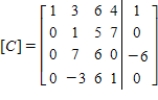
A) 
B) 
C)

D) 
E)


A)

B)

C)

D)

E)


Unlock Deck
Unlock for access to all 97 flashcards in this deck.
Unlock Deck
k this deck
43
Given the matrix, perform elementary row operations to obtain a zeros above and below the 1 in the second column without changing the entries in the first column.
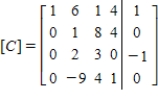


Unlock Deck
Unlock for access to all 97 flashcards in this deck.
Unlock Deck
k this deck
44
If row 7 of a matrix [A] is multiplied by 4 and then added to row 4 of [A], then the correct notation is *Row (4,[A],7,4). Decide whether the statement is true or false.

Unlock Deck
Unlock for access to all 97 flashcards in this deck.
Unlock Deck
k this deck
45
Solve the system by the Gauss-Jordan method.



Unlock Deck
Unlock for access to all 97 flashcards in this deck.
Unlock Deck
k this deck
46
Suppose Ingredient I is made up of 80% micoden and 20% water, Ingredient II is made up of 30% micoden, 50% bixon, and 20% water, and these ingredients are mixed together. How much micoden is in the mixture? INGREDIENT I
INGREDIENT II
MIXTURE
2 lb
11 lb
13 lb
A) 1.6 lb
B) 4.9 lb
C) 2.2 lb
D) 13 lb
E) 3.3 lb
INGREDIENT II
MIXTURE
2 lb
11 lb
13 lb
A) 1.6 lb
B) 4.9 lb
C) 2.2 lb
D) 13 lb
E) 3.3 lb

Unlock Deck
Unlock for access to all 97 flashcards in this deck.
Unlock Deck
k this deck
47
A candy maker mixes chocolate, milk, and mint extract to produce three kinds of candy (I, II, and III) with the following proportions. If 78 lb of chocolate, 56 gal of milk, and 28 oz of mint extract are available, how much of each kind of candy can be produced?
I : 7 lb chocolate, 5 gal milk, 1 oz mint extract
II : 3 lb chocolate, 2 gal milk, 2 oz mint extract
III : 4 lb chocolate, 3 gal milk, 3 oz mint extract
__________units of candy | can be produced
__________ units of candy || can be produced
__________ units of candy ||| can be produced
I : 7 lb chocolate, 5 gal milk, 1 oz mint extract
II : 3 lb chocolate, 2 gal milk, 2 oz mint extract
III : 4 lb chocolate, 3 gal milk, 3 oz mint extract
__________units of candy | can be produced
__________ units of candy || can be produced
__________ units of candy ||| can be produced

Unlock Deck
Unlock for access to all 97 flashcards in this deck.
Unlock Deck
k this deck
48
Solve the system by the Gauss-Jordan method.



Unlock Deck
Unlock for access to all 97 flashcards in this deck.
Unlock Deck
k this deck
49
A box contains twenty-five more dimes than nickels. How many dimes are there if the total value is $5.80?
A) 22 dimes
B) 47 dimes
C) 25 dimes
D) 15 dimes
E) 40 dimes
A) 22 dimes
B) 47 dimes
C) 25 dimes
D) 15 dimes
E) 40 dimes

Unlock Deck
Unlock for access to all 97 flashcards in this deck.
Unlock Deck
k this deck
50
Given the matrix, perform elementary row operation to obtain zeros under the 1 in the first column.



Unlock Deck
Unlock for access to all 97 flashcards in this deck.
Unlock Deck
k this deck
51
Solve the system by the Gauss-Jordan method. 
A)
B) 
C) 
D) 
E) inconsistent

A)

B)

C)

D)

E) inconsistent

Unlock Deck
Unlock for access to all 97 flashcards in this deck.
Unlock Deck
k this deck
52
An after-shave lotion is 50% alcohol. If you have 4 fluid ounces of the lotion, how much water must be added to reduce the mixture to 10% alcohol?
A) 32 oz
B) 16 oz
C) 200 oz
D) 20 oz
E) 4 oz
A) 32 oz
B) 16 oz
C) 200 oz
D) 20 oz
E) 4 oz

Unlock Deck
Unlock for access to all 97 flashcards in this deck.
Unlock Deck
k this deck
53
Solve the system by the Gauss-Jordan method. 
A)
B) 
C) 
D) 
E) inconsistent

A)

B)

C)

D)

E) inconsistent

Unlock Deck
Unlock for access to all 97 flashcards in this deck.
Unlock Deck
k this deck
54
Solve the system by the Gauss-Jordan method.



Unlock Deck
Unlock for access to all 97 flashcards in this deck.
Unlock Deck
k this deck
55
If row 5 of a matrix [C] is multiplied by -3 and then added to row 6 of [C], then the correct notation is Row+(-3,[C],6,5). Decide whether the statement is true or false.

Unlock Deck
Unlock for access to all 97 flashcards in this deck.
Unlock Deck
k this deck
56
Given the matrix, perform elementary row operation to obtain a 1 in the row 1, column 1 position.



Unlock Deck
Unlock for access to all 97 flashcards in this deck.
Unlock Deck
k this deck
57
A certain item has a linear supply curve  and a linear demand curve
and a linear demand curve  , where p is the price and n is the number of items. What is the equilibrium point (p, n)?
, where p is the price and n is the number of items. What is the equilibrium point (p, n)?
A) (1, 100,000)
B) (2, 10,000)
C) (9,000, 2)
D) (10,000, 2)
E) (1,000, 4)
 and a linear demand curve
and a linear demand curve  , where p is the price and n is the number of items. What is the equilibrium point (p, n)?
, where p is the price and n is the number of items. What is the equilibrium point (p, n)? A) (1, 100,000)
B) (2, 10,000)
C) (9,000, 2)
D) (10,000, 2)
E) (1,000, 4)

Unlock Deck
Unlock for access to all 97 flashcards in this deck.
Unlock Deck
k this deck
58
Solve the system by the Gauss-Jordan method.

A)
B) 
C) 
D) 
E) inconsistent

A)

B)

C)

D)

E) inconsistent

Unlock Deck
Unlock for access to all 97 flashcards in this deck.
Unlock Deck
k this deck
59
A candy maker mixes chocolate, milk, and mint extract to produce three kinds of candy (I, II, and III) with the following proportions. If 75 lb of chocolate, 52 gal of milk, and 36 oz of mint extract are available, how much of each kind of candy can be produced?
I : 7 lb chocolate, 5 gal milk, 1 oz mint extract
II : 3 lb chocolate, 2 gal milk, 2 oz mint extract
III : 4 lb chocolate, 3 gal milk, 3 oz mint extract
A) 5 units of candy |, 15 units of candy ||, 2 units of candy |||
B) 5 units of candy |, 14 units of candy ||, 2 units of candy |||
C) 4 units of candy |, 16 units of candy ||, 3 units of candy |||
D) 4 units of candy |, 13 units of candy ||, 2 units of candy |||
E) 5 units of candy |, 13 units of candy ||, 3 units of candy |||
I : 7 lb chocolate, 5 gal milk, 1 oz mint extract
II : 3 lb chocolate, 2 gal milk, 2 oz mint extract
III : 4 lb chocolate, 3 gal milk, 3 oz mint extract
A) 5 units of candy |, 15 units of candy ||, 2 units of candy |||
B) 5 units of candy |, 14 units of candy ||, 2 units of candy |||
C) 4 units of candy |, 16 units of candy ||, 3 units of candy |||
D) 4 units of candy |, 13 units of candy ||, 2 units of candy |||
E) 5 units of candy |, 13 units of candy ||, 3 units of candy |||

Unlock Deck
Unlock for access to all 97 flashcards in this deck.
Unlock Deck
k this deck
60
Solve the system by the Gauss-Jordan method.



Unlock Deck
Unlock for access to all 97 flashcards in this deck.
Unlock Deck
k this deck
61
Suppose Ingredient I is made up of 80% micoden and 20% water, Ingredient II is made up of 30% micoden, 60% bixon, and 10% water, and these ingredients are mixed together. How much micoden is in the mixture? Round to one decimal place, if required. 
__________ lb micoden

__________ lb micoden

Unlock Deck
Unlock for access to all 97 flashcards in this deck.
Unlock Deck
k this deck
62
Solve the system by graphing. 
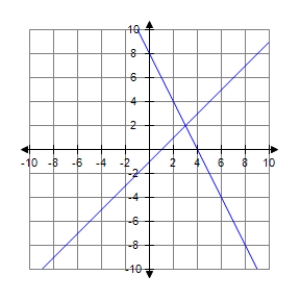
A)
B)
C)
D)
E) inconsistent


A)

B)

C)

D)

E) inconsistent

Unlock Deck
Unlock for access to all 97 flashcards in this deck.
Unlock Deck
k this deck
63
A plane with a tail wind makes its 987-mile flight in 3 hours. The return flight against the wind takes a half hour longer. What is the wind speed?
A) 21.5 mph
B) 282 mph
C) 26 mph
D) 23.5 mph
E) 305.5 mph
A) 21.5 mph
B) 282 mph
C) 26 mph
D) 23.5 mph
E) 305.5 mph

Unlock Deck
Unlock for access to all 97 flashcards in this deck.
Unlock Deck
k this deck
64
The demand for a product varies from 100,000 units at $130 per unit to 250,000 at $40 per unit. Also, 150,000 could be supplied at $30 per unit, whereas only 250,000 could be supplied for $110 each. Find the equilibrium point for the system (p, n).

Unlock Deck
Unlock for access to all 97 flashcards in this deck.
Unlock Deck
k this deck
65
A collection of coins has a value of $4.89. There is the same number of nickels and dimes but seven fewer pennies than nickels or dimes. How many pennies are in the collection if there are 86 coins?
__________ pennies
__________ pennies

Unlock Deck
Unlock for access to all 97 flashcards in this deck.
Unlock Deck
k this deck
66
How many gallons of 27% butterfat cream must be mixed with 500 gallons of 3% butterfat milk to obtain a 7% butterfat milk?
__________ gallons of 27% butterfat cream.
__________ gallons of 27% butterfat cream.

Unlock Deck
Unlock for access to all 97 flashcards in this deck.
Unlock Deck
k this deck
67
You have a 24% silver alloy and some pure silver. How much of each must be mixed to obtain 100 oz of 43% silver?
A) 75 oz silver and 25 oz alloy
B) 19 oz silver and 81 oz alloy
C) 24 oz silver and 76 oz alloy
D) 76 oz silver and 24 oz alloy
E) 25 oz silver and 75 oz alloy
A) 75 oz silver and 25 oz alloy
B) 19 oz silver and 81 oz alloy
C) 24 oz silver and 76 oz alloy
D) 76 oz silver and 24 oz alloy
E) 25 oz silver and 75 oz alloy

Unlock Deck
Unlock for access to all 97 flashcards in this deck.
Unlock Deck
k this deck
68
Suppose Ingredient I is made up of 40% micoden and 60% water, Ingredient II is made up of 30% micoden, 10% bixon, and 60% water, and these ingredients are mixed together. What is the percentage of water in mixture below?  __________%
__________%
 __________%
__________%
Unlock Deck
Unlock for access to all 97 flashcards in this deck.
Unlock Deck
k this deck
69
Solve the system by graphing. 
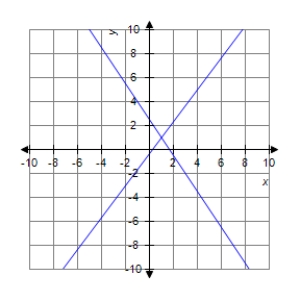
A)
B)
C)
D)
E) inconsistent


A)

B)

C)

D)

E) inconsistent

Unlock Deck
Unlock for access to all 97 flashcards in this deck.
Unlock Deck
k this deck
70
Solve the system by the substitution method. 
A)
B)
C)
D)
E) inconsistent

A)

B)

C)

D)

E) inconsistent

Unlock Deck
Unlock for access to all 97 flashcards in this deck.
Unlock Deck
k this deck
71
You have a 48% silver alloy and some pure silver. How much of each must be mixed to obtain 100 oz of 61% silver?
__________ oz of silver and __________ oz of alloy
__________ oz of silver and __________ oz of alloy

Unlock Deck
Unlock for access to all 97 flashcards in this deck.
Unlock Deck
k this deck
72
The box contains twenty-five more dimes than nickels. How many of each type of coin is there if the total value is $6.40?
__________ nickels __________ dimes
__________ nickels __________ dimes

Unlock Deck
Unlock for access to all 97 flashcards in this deck.
Unlock Deck
k this deck
73
How many gallons of 26% butterfat cream must be mixed with 300 gallons of 2% butterfat milk to obtain a 6% butterfat milk?
A) 12 gallons
B) 90 gallons
C) 6 gallons
D) 60 gallons
E) 62 gallons
A) 12 gallons
B) 90 gallons
C) 6 gallons
D) 60 gallons
E) 62 gallons

Unlock Deck
Unlock for access to all 97 flashcards in this deck.
Unlock Deck
k this deck
74
Solve the system by the substitution method. 
A)
B)
C)
D)
E) inconsistent

A)

B)

C)

D)

E) inconsistent

Unlock Deck
Unlock for access to all 97 flashcards in this deck.
Unlock Deck
k this deck
75
A collection of coins has a value of $4.12. There is the same number of nickels and dimes but four fewer pennies than nickels or dimes. How many pennies are in the collection if there are 74 coins?
A) 15 pennies
B) 32 pennies
C) 22 pennies
D) 4 pennies
E) 34 pennies
A) 15 pennies
B) 32 pennies
C) 22 pennies
D) 4 pennies
E) 34 pennies

Unlock Deck
Unlock for access to all 97 flashcards in this deck.
Unlock Deck
k this deck
76
A certain item has a linear supply curve  and a linear demand curve
and a linear demand curve  , where p is the price and n is the number of items. What is the equilibrium point (p, n)?
, where p is the price and n is the number of items. What is the equilibrium point (p, n)?
 and a linear demand curve
and a linear demand curve  , where p is the price and n is the number of items. What is the equilibrium point (p, n)?
, where p is the price and n is the number of items. What is the equilibrium point (p, n)?
Unlock Deck
Unlock for access to all 97 flashcards in this deck.
Unlock Deck
k this deck
77
An after-shave lotion is 40% alcohol. If you have 15 fluid ounces of the lotion, how much water must be added to reduce the mixture to 30% alcohol?
__________ ounces of water
__________ ounces of water

Unlock Deck
Unlock for access to all 97 flashcards in this deck.
Unlock Deck
k this deck
78
Solve the system by the addition method. 
A)
B)
C)
D)
E) inconsistent

A)

B)

C)

D)

E) inconsistent

Unlock Deck
Unlock for access to all 97 flashcards in this deck.
Unlock Deck
k this deck
79
Suppose Ingredient I is made up of 40% micoden and 60% water, Ingredient II is made up of 10% micoden, 30% bixon, and 60% water, and these ingredients are mixed together. What is the percentage of water in mixture below? 
A) 120%
B) 50%
C) 80%
D) 60%
E) 160%

A) 120%
B) 50%
C) 80%
D) 60%
E) 160%

Unlock Deck
Unlock for access to all 97 flashcards in this deck.
Unlock Deck
k this deck
80
A plane with a tail wind makes its 1,440-mile flight in 4 hours. The return flight against the wind takes a half hour longer. What is the wind speed? Round to one decimal place, if required.
__________ mph
__________ mph

Unlock Deck
Unlock for access to all 97 flashcards in this deck.
Unlock Deck
k this deck



